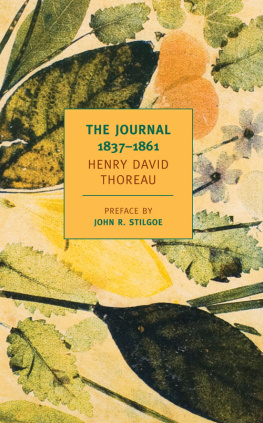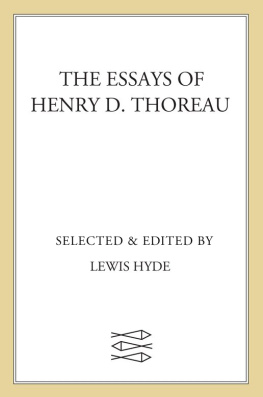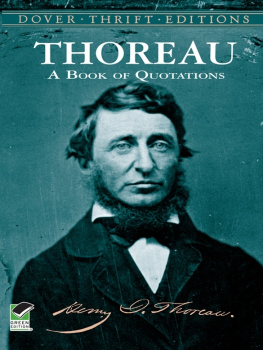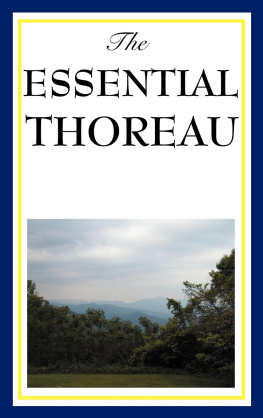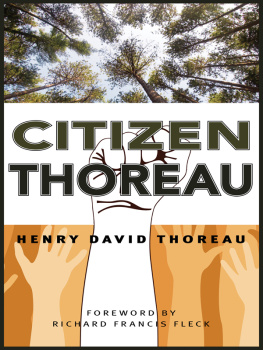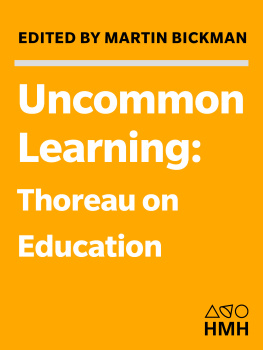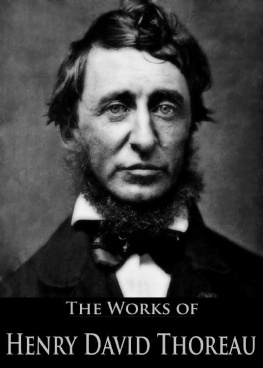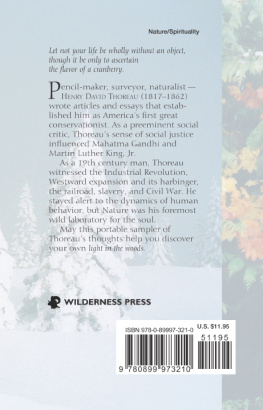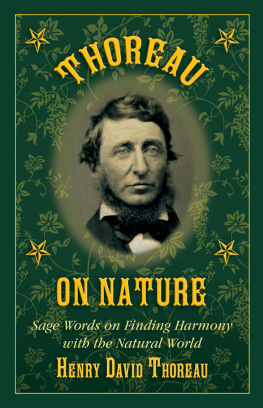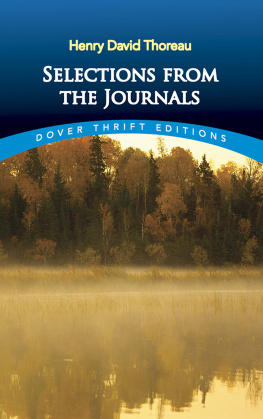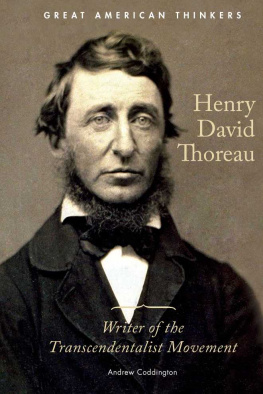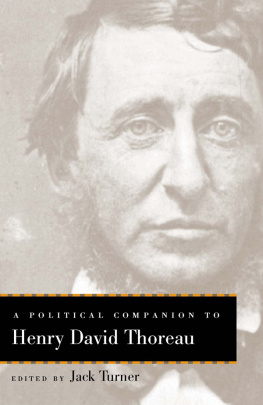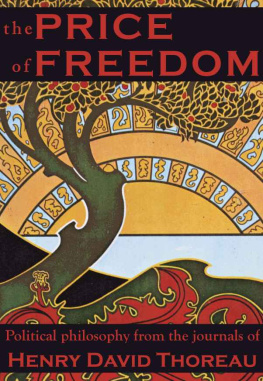
HENRY DAVID THOREAU (18171862) was born and lived the greater part of his life in Concord, Massachusetts. He studied at Harvard, where he became a disciple of Emerson, and after graduating in 1837 returned to Concord to teach school with his brother. In Concord, he became acquainted with the members of the Transcendentalist Club and grew especially close to Emerson, for whom he worked as a handyman. Thoreau also began to write for The Dial and other magazines, and in 1839 he made the boat trip that became the subject of his first book, A Week on the Concord and Merri-mack Rivers (1849). On July 4, 1845, he moved into the hut hed constructed on Walden Pond, where he remained until September 6, 1847a sojourn that inspired his great work Walden , published in 1854. In the 1850s, Thoreau became increasingly active in the abolitionist cause, meeting John Brown at Emersons house in 1857 and, after the attack on Harpers Ferry, writing passionately in Browns defense. Short trips to Maine and Cape Cod resulted in two post-humously published books ( The Maine Woods and Cape Cod ), and a visit to New York led to a meeting with Walt Whitman. Suffering from tuberculosis, Thoreau traveled to the Great Lakes for the sake of his health, but finding no improvement and realizing that he was going to die, returned home to Concord to put his papers in order and to write his final essays, drawing as always on the Journal, the work that was the source of all his other works and the defining undertaking of his adult life.
DAMION SEARLS is the author of Everything You Say Is True , a travelogue, and What We Were Doing and Where We Were Going , stories. He is also an award-winning translator from German, French, Norwegian, and Dutch, most recently of Rainer Maria Rilkes The Inner Sky: Poems, Notes, Dreams and Marcel Prousts On Reading . He has produced an experimental edition of Herman Melvilles Moby-Dick , called ; or The Whale , and his translation of the Dutch writer Nescios stories is forthcoming from NYRB Classics.
JOHN R. STILGOE is the author of many books and the Robert and Lois Orchard Professor in the History of Landscape at Harvard University.
THE JOURNAL
18371861
HENRY DAVID THOREAU
Edited by
DAMION SEARLS
Preface by
JOHN R. STILGOE
NEW YORK REVIEW BOOKS

New York
CONTENTS
PREFACE
To Pine Hill for chestnuts. And on the way an Irish-immigrant woman and her son, bent double under loads of firewood, Old World in appearance but doing the squaws part in many respects, encounter the solitary walker. Another day, To owls nest. The young owls are gone. Period. Fledglings flown. But the day after, a question recorded. What if we feel a yearning to which no breast answers? I walk alone. Then some thoughts about frivolity, society, and personal shallowness. On the last day of one September, a musing about the color of leaves: The white ash has got its autumnal mulberry hue. But then something more. It is with leaves as with fruits and woods, and animals and men; when they are mature their different characters appear. And the next day, something else, down by the railroad track. Just put a fugitive slave, who has taken the name of Henry Williams, into the cars for Canada.
Here find the private musings of a solitary seer, the odd man of Concord. Hornets, hyenas, and baboons are not so great a curse to a country as men of a similar character, Thoreau decided one early-autumn day. But then again, he knew he had circumscribed his life, focused his energy within the town bounds of Concord, walking the edges as a surveyor, pacing the whole as a self-appointed visionary. It is a charmed circle which I have drawn around my abode, having walked not with God but with the devil. I am too well aware when I have crossed this line.
What line? He knew the town boundary lines, knew enough to look beyond, to see such near hills as Nobscot and Nashoba, the far-off glimmerings of others in the sunlight. He knew the paths and byways and shortcuts and railroad rights-of-way and the rivers along which he rowed and skated and swam. He knew the line dividing his private goals from the mean and narrow-minded men he scorned, as when one of sixty asked about buying a bearing orchard when he might have planted fruit trees thirty years earlier. Arrogant, supercilious, observant, but often doubting himself, he wrote for himself, averring that most New England biographies and journalsJohn Adamss not exceptedaffect me like opening of the tombs. And the tombs he meant lay in the Concord graveyard, not Luxor.
Winter prompted him to ponder journalizing. He moved about the house, from one sunny window to another. My Journal is that of me which would else spill over and run to waste, but then again, maybe not. Another winter day, another vision of the book. To set down such choice experiences that my own writings may inspire me and at last I may make wholes of parts. Journalizing is not journalism but a distinct profession rescuing details and truths from oblivion. Contemplation of the unfinished picture may suggest its harmonious completion, every thought a nest egg a long time from hatching. Thoughts accidentally thrown together become a frame in which more may be developed and exhibited. Perhaps this is the main value of a habit of writing, of keeping a journal,that so we remember our best hours and stimulate ourselves. And in another January, years later, something similar but not the same: In keeping a journal of ones walks and thoughts it seems to be worth the while to record those phenomena which are most interesting to us at the time. Indeed. Such is the weather. The weather. That which shapes the Concord-circumscribed world, the affairs of just farmers and vagrants, the turn of seasons, the color of everything, the fall of light and shadow: the weather. Here is much about weather, including weather beyond the window-pane but not beyond the manuscript book, and in all weather, much of the footprints of Henry David Thoreau, the man who thus

